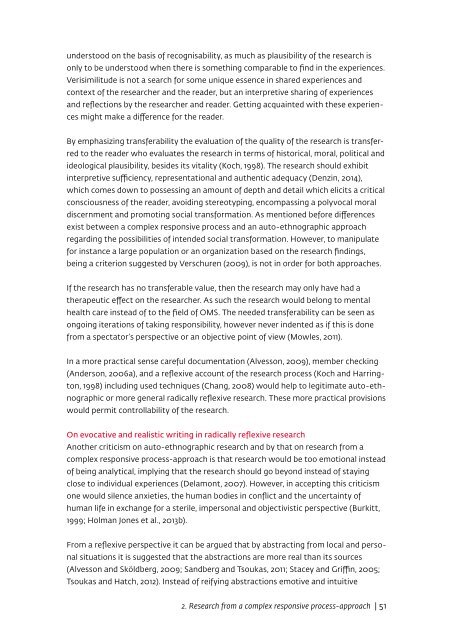Rumbling on performativity_Frits Simon
Rumbling on performativity_Frits Simon
Rumbling on performativity_Frits Simon
You also want an ePaper? Increase the reach of your titles
YUMPU automatically turns print PDFs into web optimized ePapers that Google loves.
understood <strong>on</strong> the basis of recognisability, as much as plausibility of the research is<br />
<strong>on</strong>ly to be understood when there is something comparable to find in the experiences.<br />
Verisimilitude is not a search for some unique essence in shared experiences and<br />
c<strong>on</strong>text of the researcher and the reader, but an interpretive sharing of experiences<br />
and reflecti<strong>on</strong>s by the researcher and reader. Getting acquainted with these experiences<br />
might make a difference for the reader.<br />
By emphasizing transferability the evaluati<strong>on</strong> of the quality of the research is transferred<br />
to the reader who evaluates the research in terms of historical, moral, political and<br />
ideological plausibility, besides its vitality (Koch, 1998). The research should exhibit<br />
interpretive sufficiency, representati<strong>on</strong>al and authentic adequacy (Denzin, 2014),<br />
which comes down to possessing an amount of depth and detail which elicits a critical<br />
c<strong>on</strong>sciousness of the reader, avoiding stereotyping, encompassing a polyvocal moral<br />
discernment and promoting social transformati<strong>on</strong>. As menti<strong>on</strong>ed before differences<br />
exist between a complex resp<strong>on</strong>sive process and an auto-ethnographic approach<br />
regarding the possibilities of intended social transformati<strong>on</strong>. However, to manipulate<br />
for instance a large populati<strong>on</strong> or an organizati<strong>on</strong> based <strong>on</strong> the research findings,<br />
being a criteri<strong>on</strong> suggested by Verschuren (2009), is not in order for both approaches.<br />
If the research has no transferable value, then the research may <strong>on</strong>ly have had a<br />
therapeutic effect <strong>on</strong> the researcher. As such the research would bel<strong>on</strong>g to mental<br />
health care instead of to the field of OMS. The needed transferability can be seen as<br />
<strong>on</strong>going iterati<strong>on</strong>s of taking resp<strong>on</strong>sibility, however never indented as if this is d<strong>on</strong>e<br />
from a spectator’s perspective or an objective point of view (Mowles, 2011).<br />
In a more practical sense careful documentati<strong>on</strong> (Alvess<strong>on</strong>, 2009), member checking<br />
(Anders<strong>on</strong>, 2006a), and a reflexive account of the research process (Koch and Harringt<strong>on</strong>,<br />
1998) including used techniques (Chang, 2008) would help to legitimate auto-ethnographic<br />
or more general radically reflexive research. These more practical provisi<strong>on</strong>s<br />
would permit c<strong>on</strong>trollability of the research.<br />
On evocative and realistic writing in radically reflexive research<br />
Another criticism <strong>on</strong> auto-ethnographic research and by that <strong>on</strong> research from a<br />
complex resp<strong>on</strong>sive process-approach is that research would be too emoti<strong>on</strong>al instead<br />
of being analytical, implying that the research should go bey<strong>on</strong>d instead of staying<br />
close to individual experiences (Delam<strong>on</strong>t, 2007). However, in accepting this criticism<br />
<strong>on</strong>e would silence anxieties, the human bodies in c<strong>on</strong>flict and the uncertainty of<br />
human life in exchange for a sterile, impers<strong>on</strong>al and objectivistic perspective (Burkitt,<br />
1999; Holman J<strong>on</strong>es et al., 2013b).<br />
From a reflexive perspective it can be argued that by abstracting from local and pers<strong>on</strong>al<br />
situati<strong>on</strong>s it is suggested that the abstracti<strong>on</strong>s are more real than its sources<br />
(Alvess<strong>on</strong> and Sköldberg, 2009; Sandberg and Tsoukas, 2011; Stacey and Griffin, 2005;<br />
Tsoukas and Hatch, 2012). Instead of reifying abstracti<strong>on</strong>s emotive and intuitive<br />
2. Research from a complex resp<strong>on</strong>sive process-approach | 51



